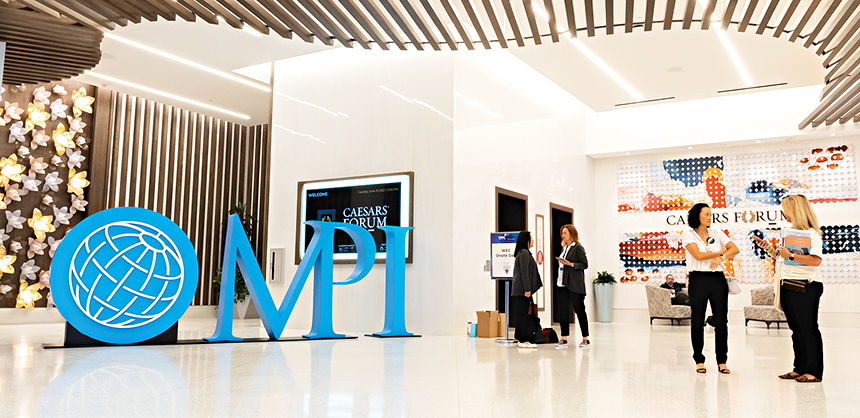Building ConnectionsOctober 20, 2023
Making Your Career Network “Work” For You By Chloe LaBelleBuilding Connections
Making Your Career Network “Work” For You
DepositPhotos.com
In the meeting and events industry, planners rely on networking. For them, it is second nature. And for those new to the business, there are some key skills to put into practice to make your career network ‘work’ for you.
The first thing to remember is: make connections and develop relationships with others in the industry before, during and way after an event is over. Not only does networking open doors for enhancing the corporate meetings and events, but it also equals currency in career enhancement and job acquisition. Even with in-house events management careers, networking is essential to planners to be able to do their jobs quickly and successfully.
Cheryl Oswald, CMP, corporate events manager at CNH Industrial in Racine, WI, said that career networking is the number one thing any planner can do, not just corporate planners.
“When I think back to how I got my start, it was all based on who I knew. I started networking at my local MPI [Meeting Professionals International] chapter and made connections, and then those connections became connections, and so forth,” Oswald said. “That also helped me reach out to suppliers that I may not have known otherwise.”
Though the pandemic took a toll on the meeting industry, the importance of networking became even more apparent to everyone. Planners moved into high gear and reached out to their network for support or to look for new positions when they lost employment. In this industry, many meeting jobs are not advertised; they are filled through word-of-mouth recommendations or by people the hirer has networked with in the course of their career.
“While I was grateful not to have lost my position during COVID, I was looking for a new role during that time, and I was consistently reaching out to my network of planners, suppliers and even non-planners,” Oswald said. “I was putting my name out there, letting people know I was looking for a new role, and looking for people with connections at the organizations I was applying to.”
Oswald landed a new position. Looking back, she recognizes that it would not have been accomplished had she not been building up and nurturing her network over the years. For planners, that means striking up conversations at industry parties and exchanging business cards or setting up informal meetings to introduce yourself and go over your CV in case of any future opportunities. Reaching out to people on online business social networks, such as LinkedIn is important too. Essentially, a planner’s circle is a goldmine and those in it need to know that you exist and what you do.
Oswald understands this. “It’s not enough to have the network, but it may not have the same effect if you aren’t consistently reaching out to those individuals,” she said. “It’s important to stay connected, reach out to those individuals, and let them know you are still there.”
Holly Beadle, CMP, conference director at PESI, Inc. in Eau Claire, WI, has been fortunate to not only make connections, but also dear friends in the event industry through her networking efforts. Those connections have been invaluable when she has needed advice or someone to come through in a pinch.
“You never know what you’ll learn from your colleagues and how that knowledge can save your organization time, resources and legal headaches,” Beadle added. “I want to be a lifelong learner and networking with others has been better than a lot of educational programs that I’ve attended. There’s a wealth of knowledge in this industry.”
As a member of the Tennessee MPI Chapter, she has formed great relationships while serving on several volunteer committees. This interaction, she observes, has taken the pressure off from networking and has allowed her to work together with other members, and see each other’s strengths.
Beadle admits that when she first started going to networking events, it felt very transactional as a lot of suppliers wanted to make a “sale.”
“The best networking is when you can make a few connections that have the potential to develop into future business without that pressure,” Beadle said. “You never know when a connection you made a few years ago will become your go-to vendor partner.”

Attending a conference — like MPI’s WEC — is a great way to make connections. Courtesy of MPI
Key Networking Techniques
There is an art behind successful networking and planners must tap into it. It involves making time to meet new people, looking for connection points with other planners, listening deeply and asking probing questions when interacting with other corporate planning professionals, all the while remaining eager to help other people grow in their careers.
“Get involved! I still remember those words someone said when I started my career,” Oswald said. “It’s truly the easiest and best way to start your network.”
How exactly do you get involved? Oswald recommends:
Join a local chapter of MPI and start volunteering. It can be as simple as managing social media or selling raffle tickets, but getting involved opens you up to meeting many different people.
Attend conferences. This is a great way to meet connections on the planner and supplier sides. Oswald has met many people by attending conferences; some are close friends today.
New to the industry? Find a mentor. Many conferences will offer first-time attendees a mentor to show them around the show and introduce them to people. Oswald has done this, and said it has been a great way to meet people.
“Honestly, I can’t think of an example that didn’t work because I think the nature of our industry is to network. We want to establish connections with each other and build relationships. That’s what our industry is about,” Oswald said.
Leveraging the Help of Others
When it comes to successful networking, corporate meeting planners need to leverage the guidance of other corporate planners to expand their networks.
During the pandemic, many planners lost their roles or were furloughed so corporate planners all leaned on each other in various ways. “Several planners and suppliers contacted me to endorse them on LinkedIn, share their resumes with any connections I had and help get their names out there,” Oswald said. “My advice to planners is to leverage those connections you have built, continue to build on them and reach out to them repeatedly. You never know when you may need each other.”
Oswald has a small group of meeting planners who have become dear friends. They meet every few months, and through that group, they share what’s happening in their personal and professional lives.
Never be afraid to ask, Beadle added. If you don’t know someone within a certain company, tap into your network and ask if anyone has a connection.
“Though the event industry is large, our connections and relationships make it smaller. Nine times out of ten, if I reach out to my fellow planner colleagues, they have the direct connection or know someone who does,” Beadle said. Relationships matter in any field but not everybody networks the same way. People have different levels of comfort interacting with others and making new connections. It takes practice and doesn’t happen overnight. As with any new initiative, it is important to formulate goals and understand your personality and your social strengths.
And as Beadle points out, establishing a strong relational foundation to people within your network can result in more significant relationships that are deeper and more meaningful. This is why solid career networking doesn’t mean making connections with thousands of people. Rather, a planner should build a small, well-defined and well-chosen network of individuals, say about 150
people who will be able to provide meaningful, sustainable connections long into the future.
Tools to Use
For some, networking is little more than swapping business cards and idling chatting with others. But to really make networking work for you and your career as a corporate meeting planner, it is best to recognize that networking can be so much more than that.
So, what tools do industry professionals recommend other planners use during their networking journey?
“LinkedIn has been a huge part of building my network,” Oswald said. “I try to take all the business cards I receive at conferences and events and connect with them on LinkedIn. I also ensure it is updated with my current work experience, industry credentials and volunteer experience. I also ask my established connections or former co-workers to endorse me and leave feedback on my work experience.”
Like Oswald, Beadle uses LinkedIn to stay connected and to continue the conversation once she has met someone. In LinkedIn, users can join different groups, and you never know who you might meet there. And that works for physical groups as well.
Oswald has joined multiple groups over her career. “I have volunteered for MPI at the chapter and global level and served on advisory and EIC [Events Industry Council] committees. When I tell you to get involved, get involved,” Oswald said.
Steps to Take
Some additional key recommended steps to take when networking:
Begin by networking with friends. Networking with people you know helps “break the ice” on your networking journey. You’ll be surprised how your friends, especially those within the meeting and events industry, can help launch you into professional relationships with others who can help you in your career.
Reconnect with forgotten acquaintances in the industry. Look through your old address book, emails, databases and other tools to identify those people who you may have lost connection with, but who you think may be good solid connections to have in your network. These could be former co-workers, mentors, professors or friends who would welcome the opportunity to reconnect with you and learn more about your current career path, and perhaps introduce you to others.
In addition to LinkedIn, do a quick Google search of corporate meeting planners or other meeting planning professionals in your community who may be good people to connect with. Social media platforms like Instagram, X and Facebook are also good networking platforms that can help you find the ideal people with whom to connect.
Evolution of Networking
Networking will continue to play a huge role in the career enhancement and overall functionality of the corporate meeting planner role.
“I don’t think networking will ever go away in our industry. As MPI often said, when we meet, we change the world and that’s true of networking,” Oswald said. “At IMEX America, networking, in my opinion, is the key component. We are all here to meet with new suppliers and planners and reconnect with others; it’s all about networking.”
As the corporate meeting planning industry has changed, so too has networking. Planners seek more meaningful connections that are catered and specialized to their needs — quality connections vs. quantity. “When I think about the connections I am making now, I look for those connections that can be more of a mentor to me in my career, those that elevate me as person — meaningful connections that will last a lifetime,” said Oswald.
Beadle agreed. “It seems like things have shifted a little bit over the past few years when we all weren’t meeting in person to network, but those soft skills will continue to be an important asset to our organizations and the events we produce,” she said. “As planners, we have to make connections internally and externally in order to meet our event goals. Building relationships will continue to be a critical piece.” C&IT








